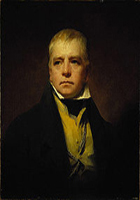Sir Walter Scott
Sir Walter Scott Poems
O young Lochinvar is come out of the west,
Through all the wide Border his steed was the best;
And save his good broadsword he weapons had none,
He rode all unarm'd, and he rode all alone.
...
Breathes there the man, with soul so dead,
Who never to himself hath said,
This is my own, my native land!
Whose heart hath ne'er within him burn'd,
...
Woman's faith, and woman's trust -
Write the characters in the dust;
Stamp them on the running stream,
Print them on the moon's pale beam,
...
The moon's on the lake, and the mist's on the brae,
And the Clan has a name that is nameless by day;
Then gather, gather, gather Grigalach!
Gather, gather, gather Grigalach!
...
Waken, lords and ladies gay,
On the mountain dawns the day;
All the jolly chase is here
With hawk and horse and hunting-spear,
...
An hour with thee! When earliest day
Dapples with gold the eastern gray,
Oh, what can frame my mind to bear
...
March, march, Ettrick and Teviotdale,
Why the deil dinna ye march forward in order!
March, march, Eskdale and Liddesdale,
All the Blue Bonnets are bound for the Border.
...
Breathes there the man, with soul so dead,
Who never to himself hath said,
'This is my own, my native land!'
...
Look not thou on beauty's charming;
Sit thou still when kings are arming;
Taste not when the wine-cup glistens;
Speak not when the people listens;
...
Thy hue, dear pledge, is pure and bright
As in that well - remember'd night
When first thy mystic braid was wove,
And first my Agnes whisper'd love.
...
It was an English ladye bright,
(The sun shines fair on Carlisle wall,)
And she would marry a Scottish knight,
For Love will still be lord of all.
...
He is gone on the mountain,
He is lost to the forest,
Like a summer-dried fountain,
When our need was the sorest.
...
From a rude isle, his ruder lineage came.
The spark, that, from a suburb hovel's hearth
Ascending, wraps some capital in flame,
...
Ah! County Guy, the hour is nigh
The sun has left the lea,
The orange-flower perfumes the bower,
The breeze is on the sea.
...
O listen, listen, ladies gay!
No haughty feat of arms I tell;
Soft is the note, and sad the lay
That mourns the lovely Rosabelle.
...
The toils are pitched, and the stakes are set,
Ever sing merrily, merrily;
The bows they bend, and the knives they whet,
Hunters live so cheerily.
...
Ah! County Guy, the hour is nigh,
The sun has left the lea,
The orange flower perfumes the bower,
The breeze is on the sea.
...
BREATHES there the man with soul so dead,
Who never to himself hath said,
'This is my own, my native land!'
Whose heart hath ne'er within him burn'd
...
Sir Walter Scott Biography
Walter Scott, born in College Wynd, Edinburgh, was the son of a lawyer. Educated first at Edinburgh High School and then University he was apprenticed to his father and called to the bar in 1792. An avid reader of poetry, history, drama and romances, the young Scott read widely in Italian, Spanish, Latin and German. In his twenties he was influenced particularly by the German Romantics and his first published works were translations of G.A. Bürger and Goethe. These were followed by the collections of border ballads and the narrative poems, written between 1805 and 1815, that first made him famous. By by this time he had also married Margaret Charlotte Charpenter, of a French Royalist family, and became sheriff-deputy of Selkirkshire, in 1797 and 1799 respectively. In 1809 Scott became partners with John Ballanytne in a book-selling business and also, as an ardent political conservative, helped to found the Tory 'Quarterly Review'. In 1811 he built a residence at Abbotsford on the Tweed. By 1815, beginning to feel eclipsed as a poet by Byron, he turned to the novel form for which he is now chiefly famous. A vast number of these were published, anonymously, over approximately the next fifteen years. In 1820 Scott was made a baronet and seven years later, in 1827, he first gave his name to his works. However, in 1826 the book-selling business became involved in the bankruptcy of another company, leaving Scott with debts of approximately £114,000. It is generally believed that some part at least of the profligacy of his writing is attributed to his desire to pay off these debts personally. His work, and along stay at Naples in 1831, undertaken in an attempt to regain his health, took up the rest of his life. He is now generally hailed as the inventor of the historical novel. His work was widely read and imitated across the whole of Europe throughout the Nineteenth-Century in particular and his influence is marked even in such writers as Elizabeth Gaskell, George Eliot and the Brontes.)
The Best Poem Of Sir Walter Scott
Answer
Sound, sound the clarion, fill the fife!
To all the sensual world proclaim,
One crowded hour of glorious life
Is worth an age without a name.
Sir Walter Scott Comments
I have written a Poem in celebration of Sir Walter Scott, called Lift Off. A stone rocket sits on Princes st, it hasn't moved for years. Its fuel used up many years ago, in the writing of great man who sits beneath it.Taking us all on a journey, fixed both in history and in the work of the readers and writers who followed. It has reached its destination.Imagination, set in stone, for all to see.
Sir Walter Scott Quotes
There is a vulgar incredulity, which in historical matters, as well as in those of religion, finds it easier to doubt than to examine.

very nice creative poems